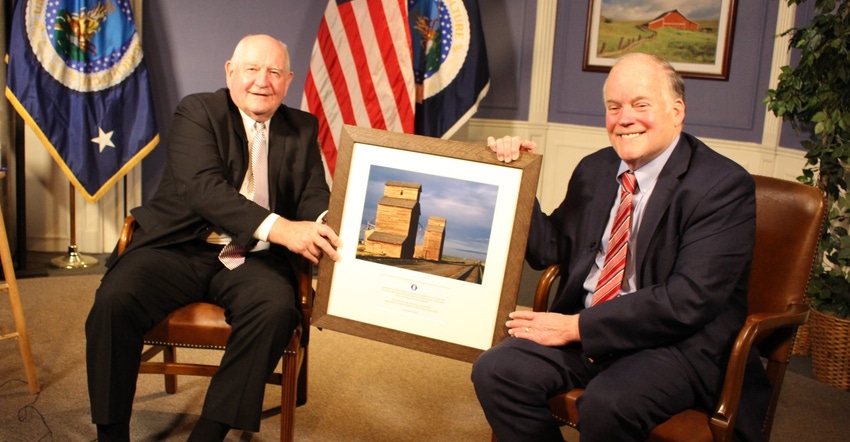
Agriculture Secretary Sonny Perdue has overseen a huge influx of government payments during his four-year tenure at USDA, but he says moving forward he continues to see the need for crop insurance as the primary safety net, and continues to encourage policies that promote U.S. productivity rather than set asides.
While speaking in a pre-recorded discussion with National Grain and Feed Association’s President Randy Gordon for NGFA’s Country Elevator Conference, Perdue says he hopes the resettling of increased commodity prices should create a profitable opportunity for producers through 2021 without another round of Market Facilitation Program or Coronavirus Food Assistance Program payments.
“I don’t think there’s an honest farmer that would rather not have a good crop and fair price rather than a government check,” Perdue says. “Although, we’re all vulnerable that if we get a check in the mail, we’d love for it to keep coming.”
Perdue says improving commodity prices also hopefully bring a good opportunity to wean farmers off the natural disaster ad hoc assistance that increased due to natural disasters and high prevented plant acres.
He says it’s unfortunate that farmers have suffered natural disasters and it is difficult to say no to requests, but he envisions the next farm bill could create a permanent disaster assistance that would not require additional ad hoc assistance.
Keeping acres productive
NGFA has also been a long-time opponent of the set asides and supportive of Sen. Pat Roberts, R-Kan., and his Freedom to Farm move in 1996 to move away from taking U.S. lands out of production. Perdue says he senses those policies have been left behind.
“We’re in a global marketplace. We can’t be nationalistic in what we do,” Perdue says. The set aside policies have proven to be “ineffective and counter-productive” and he encouraged NGFA to “continue to be a guardian” in protecting against policymakers from moving back in that direction.
“We’ve got to be a better salesman and remain the lowest cost producers where we can compete globally around the world,” Perdue says.
Perdue discussed that he was glad to hear President-elect Biden say that he will not eliminate tariffs right away with China to continue to build on the recent strength in exports despite the geopolitical considerations. He gave credit to U.S. Trade Ambassador Bob Lighthizer and Treasury Secretary Steven Mnuchin for continuing to communicate and establishing a trusted relationship.
“[China] needs our product, and obviously we need their business,” Perdue says.
Although imports may not reach the targeted numbers called for under the Phase One trade agreement, Perdue says China did address 50 of the 57 non-tariff trade barriers identified in the deal. They do remain a huge customer for U.S. agricultural products.
Perdue also recalled in his first days of office when approaching President Donald Trump about the importance of not withdrawing from NAFTA, and Perdue saw firsthand that President Trump can have his mind changed as he had an executive order drafted for the withdrawal. “Most people agree that USMCA is better in all aspects,” he says.
About the Author(s)
You May Also Like






